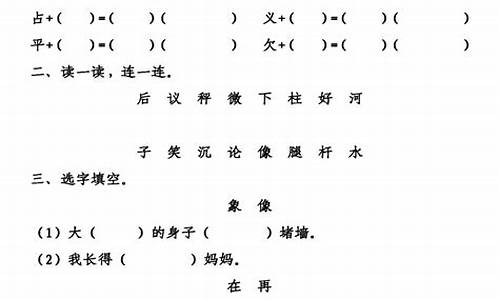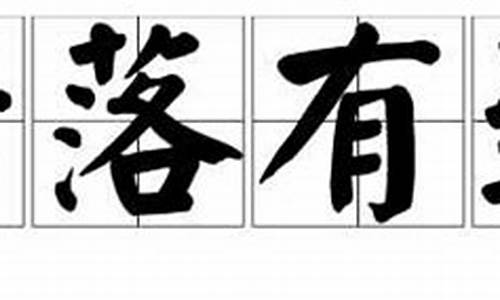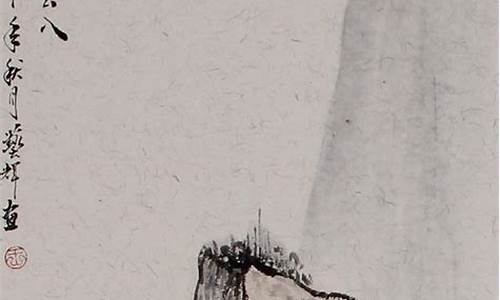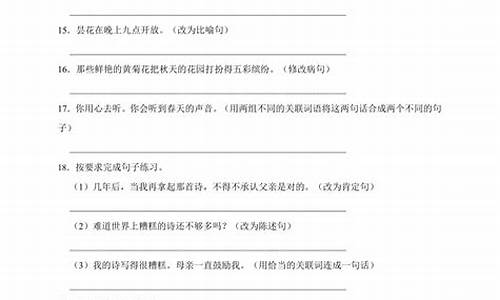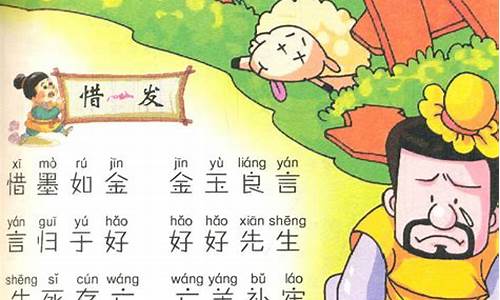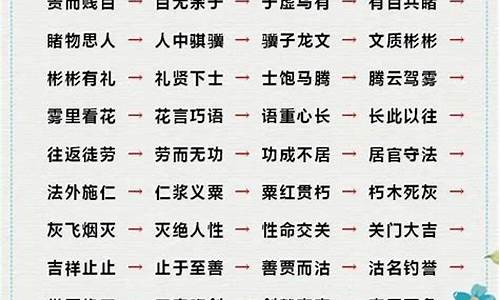中国成语故事英文版_中国成语故事英文版简短
下面,我将用我自己的方式来解释中国成语故事英文版的问题,希望我的回答能够对大家有所帮助。让我们开始讨论一下中国成语故事英文版的话题。
1.中国成语故事中英对照 望梅止渴
2.山中无老虎,猴子称霸王翻译
3.求中国传统文化的历史经典故事、民间传说、成语故事的英语改编。
4.用英语简写一个中国成语故事(提示:要有记述文的要素,When…?Where…?Who…?What…
5.简单英语中国成语故事30字
6.中国传统文化的历史经典故事、民间传说、成语故事的英语改编
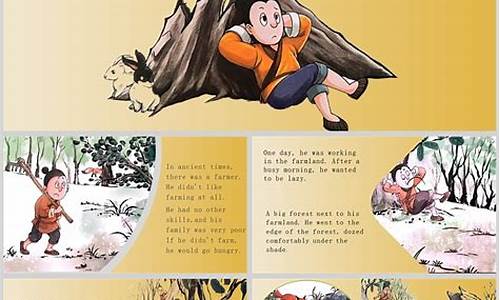
中国成语故事中英对照 望梅止渴
望梅止渴
[读音][wàng méi zhǐ kě]
[解释]原意是梅子酸,人想吃梅子就会流涎,因而止渴。后比喻愿望无法实现,用空想安慰自己。
[出处]元·贾仲名《对玉梳》:“你要我便是望梅止渴。”
[近义]说梅止渴纸上谈兵聊以止渴望梅指雁为羹画饼充饥
[反义]名副其实实事求是脚踏实地
山中无老虎,猴子称霸王翻译
⑴ 守株待兔的成语故事守株待兔成语故事:
相传在战国时代宋国,有一个农民,日出而作,日入而息.遇到好年景,也不过刚刚吃饱穿暖;一遇灾荒,可就要忍饥挨饿了.他想改善生活,但他太懒,胆子又特小,干什么都是又懒又怕,总想碰到送上门来的意外之财。
奇迹终于发生了。深秋的一天,他正在田里耕地,周围有人在打猎。吆喝之声四处起伏,受惊的小野兽没命的奔跑。突然,有一只兔子,不偏不倚,一头撞死在他田边的树根上。当天,他美美地饱餐了一顿。
从此,他便不再种地。一天到晚,守着那神奇的树根,等着奇迹的出现。
成语“守株待兔”,比喻亡想不劳而得,或死守狭隘的经验,不知变通。
(1)守株待兔成语故事英文版扩展阅读
守株待兔
成语拼音:shǒu zhū dài tù
成语解释:比喻死守狭隘经验;不知变通;或抱着侥幸心理妄想不劳而获。
成语出处:战国 韩韩非《韩非子五蠹》:“宋人有耕田者,田中有株,兔也,触柱折颈而死。”
成语用法:守株待兔连动式;作宾语、定语;含贬义。
成语正音:待,不能读作“dǎi”。
成语辨形:待,不能写作“侍”。
成语辨析:守株待兔和“刻舟求剑”;都含有“不知变通”之意。但守株待兔重在“守”和“待”;形容人不作主观努力;只是存在侥幸心理;想获得意外成功;而“刻舟求剑”偏重于“刻”和“求”;强调虽然主观上努力;但不了解情况变化;不知变通而采取错误方法。
近义词:刻舟求剑、墨守成规
反义词:通达权变
成语例子:吾料兄必定出身报国,岂是守株待兔之辈。(明许仲琳《封神演义》第九十四回)
⑵ 成语故事《守株待兔》动画
成语: 守株待兔
拼音: shǒu zhū dài tù
解释: 株:露出地面的树根。原比喻希图不经过努力而得到成功的侥幸心理。现也比喻死守狭隘经验,不知变通。
出处: 《韩非子·五蠹》记载:战国时宋国有一个农民,看见一只兔子撞在树根上死了,便放下锄头在树根旁等待,希望再得到撞死的兔子。
举例造句: 吾料兄必定出身报国,岂是守株待兔之辈! 明·许仲琳《封神演义》第九十四
拼音代码: szdt
近义词:刻舟求剑、墨守成规
反义词: 通达权变
灯谜: 柳
用法: 作宾语、定语;指不知变通
英文: stand by a stump waiting for more hares to e and clash themselves against it--trust to chance and windfalls
故事: 从前宋国有一个农夫在地里干活,忽然从远处跑来一只兔子,它十分慌张,一不小心就撞在树桩上死了。农夫很高兴,捡起这只死兔子回家美美地饱餐一顿。他想每天都有这样的好事就好了,于是他放下农具整天守在那颗树下,一无所获
动画网址网页链接
⑶ 英语版中国成语故事
江郎才尽
Southern Dynasties of Jiang Yan, word Wen-tung, when he was young, became a Dingdingyouming writer, his poems and articles at the time received high acclaims. However, when he is getting older, he has not previously written an article good, but a lot of setbacks. His poems written in prosaic; and pick up a pen-yin grip for a long time, still can not write a word, the occasional inspiration came; poem written, but the textual Kuse, content, plain were pletely useless. So some people to legend, once a boat parked in Chan Jiang Yan-Ling Monastery river and dream of a self-named Zhang Jingyang person; to his followers repay a silk, he would arrest a few feet from her, he is also silk. Thus, his article there will be no wonderful. It was also legend; once the rule of Jiang Yan in the booth sleeping too; dreamed that a person claiming to Guo Pu, walked over to his side, his claim to the pen, said to him: "Man Michie, I have a pen in your place has been a long time, and now should be able to give it to me the bar! "Jiang Yan heard, they dig out from his arms, he is also a five-color pen. Reportedly Since then, Jiang Yan on Evans exhausted and could not write the article in any good.
Jiang Yan's talent has not really run out, but he was an officer after the one hand, as the Chief busy, on the other hand also because of career proud of, without their own write, to sweat, they did not write the. Over time, the article will bring out less, lacking in talent. (Excerpt from "Practical Writing" 1995 No. 8 "I hope," Jiang "was not exactly")
南朝的江淹,字文通,他年轻的时候,就成为一个鼎鼎有名的文学家,他的诗和文章在当时获得极高的评价。 可是,当他年纪渐渐大了以后,他的文章不但没有以前写得好了,而且退步不少。他的诗写出来平淡无奇;而且提笔吟握好久,依旧写不出一个字来,偶尔灵感来了;诗写出来了,但文句枯涩,内容 平淡得一无可取。于是就有人传说,有一次江淹乘船停在禅灵寺的河边,梦见一 个自称叫张景阳的人;向他讨还一匹绸缎,他就从怀中拘出几尺绸缎还他。因此,他的文章以后便不精彩了。又有人传说;有一次江淹在冶亭中睡午觉;梦见一个自称郭璞 的人,走到他的身边,向他索笔,对他说:“文通兄,我有一支笔在你那儿已经很久了,现在应该可以还给我了吧!” 江淹听了,就顺手从怀里取出一支五色笔来还他。据说从此以后,江淹就文思枯竭,再也写不出什么好的文章了。
其实并不是江淹的才华已经用完了,而是他当官以后,一方面由于政务繁忙,另一方面也由于仕途得意,无需自己动笔,劳心费力,就不再动笔了。久而久之,文章自然会逐渐逊色,缺乏才气。(节选自《应用写作》1995年第8期《但愿“江郎”才不尽》)
⑷ 守株待兔成语故事350字
守株待兔
宋国有个农夫种着几亩地,他的地头上有一棵大树,
守株待兔的成语故事
。一天,他在地里干活,忽然看见一只兔子箭一般地飞奔过来,猛的撞在那棵大树上,一下子把脖子折断了,蹬蹬腿就死了。这个农夫飞快的跑过去,把兔子捡起来,高兴地说:“这真是一点劲没费,白捡了个大便宜,回去可以美美地吃上一顿了。”他拎着兔子一边往家走,一边得意地想:“我的运气真好, 没准明天还会有兔子跑来,我可不能放过这样的便宜。” 第二天,他到地里,也不干活,只守着那棵大树,等着兔子撞过来。结果,等了一天什么也没等到。他却不甘心,从此,天天坐在那棵大树下等着兔子来撞死。他等呀等呀,直等到地里的野草长得比庄稼都高了,连个兔子影也没有再见到。
⑸ 守株待兔的成语故事(50——100字左右)
从前宋国有一个农夫在地里干活,忽然从远处跑来一只兔子,它十分慌张,一不小心就撞在树桩上死了。农夫很高兴,捡起这只死兔子回家美美地饱餐一顿。他想每天都有这样的好事就好了,于是他放下农具整天守在那颗树下,一无所获。
(5)守株待兔成语故事英文版扩展阅读
守株待兔
成语拼音:shǒu zhū dài tù
成语解释:比喻死守狭隘经验;不知变通;或抱着侥幸心理妄想不劳而获。
成语出处:战国 韩韩非《韩非子五蠹》:“宋人有耕田者,田中有株,兔也,触柱折颈而死。”
成语用法:守株待兔连动式;作宾语、定语;含贬义。
成语正音:待,不能读作“dǎi”。
成语辨形:待,不能写作“侍”。
成语辨析:守株待兔和“刻舟求剑”;都含有“不知变通”之意。但守株待兔重在“守”和“待”;形容人不作主观努力;只是存在侥幸心理;想获得意外成功;而“刻舟求剑”偏重于“刻”和“求”;强调虽然主观上努力;但不了解情况变化;不知变通而采取错误方法。
近义词:刻舟求剑、墨守成规
反义词:通达权变
成语例子:吾料兄必定出身报国,岂是守株待兔之辈。(明许仲琳《封神演义》第九十四回)
⑹ 现代版成语故事《守株待兔》
守株待兔
shǒu zhū dài tù
解释株:露出地面的树根。原比喻希图不经过努力而版得到成功的侥幸心权理。现也比喻死守狭隘经验,不知变通。
出处《韩非子·五蠹》记载:战国时宋国有一个农民,看见一只兔子撞在树根上死了,便放下锄头在树根旁等待,希望再得到撞死的兔子。
结构连动式。
用法用作贬义。一般作宾语、定语。
正音待;不能读作“dǎi”。
辨形待;不能写作“侍”。
近义词刻舟求剑、墨守成规
反义词通达权变
辨析~和“刻舟求剑”;都含有“不知变通”之意。但~重在“守”和“待”;形容人不作主观努力;只是存在侥幸心理;想获得意外成功;而“刻舟求剑”偏重于“刻”和“求”;强调虽然主观上努力;但不了解情况变化;不知变通而采取错误方法。
例句美好的生活要靠自己去创造;这样如同~;能有好日子过吗?
英译waitfainswithoutpains
⑺ 中英文版成语故事书。
广州市北京路科技图书馆有得卖!成语典故
⑻ 守株待兔 成语故事 贝瓦
守株待兔 shǒu zhū dài tù
解释: 株:露出地面的树根。原比喻希图不经过努力而得到成功的侥幸心理。现也比喻死守狭隘经验,不知变通。
成语故事:
春秋时代有位宋国的农夫,他每天早上很早就到田里工作,一直到太阳下山才收拾农具准备回家。有一天,农夫正在田里辛苦的工作,突然却远远跑来一只兔子。这只兔子跑得又急又快,一个不小心,兔子撞上稻田旁边的大树,这一撞,撞断了兔子的颈部,兔子当场倒地死亡。一旁的农夫看到之后,急忙跑上前将死了的兔子一手抓起,然后很开心的收拾农具准备回家把这只兔子煮来吃。农夫心想,天底下既然有这么好的事,自己又何必每天辛苦的耕田?
从此以后,他整天守在大树旁,希望能再等到不小心撞死的兔子。可是许多天过去了,他都没等到撞死在大树下的兔子,反而因为他不处理农田的事,因此田里长满了杂草,一天比一天更荒芜。
⑼ 小学一年级英汉双译成语故事:守株待兔
成语故事:宋国有个农夫正在田里翻土。突然,他看见有一只野兔从旁边的草丛里慌慌张张地窜出来,一头撞在田边的树墩子上,便倒在那儿一动也不动了。农民走过去一看:兔子死了。因为它奔跑的速度太快,把脖子都撞折(shé)了。农民高兴极了,他一点力气没花,就白捡了一只又肥又大的野兔。他心想;:要是天天都能捡到野兔,日子就好过了。从此,他再也不肯出力气种地了。每天,他把锄头放在身边,就躺在树墩子跟前,等待着第二只、第三只野兔自己撞到这树墩子上来。世上哪有那么多便宜事啊。农民当然没有再捡到撞死的野兔,而他的田地却荒芜了。因为没能再次得到兔子,农民自己沦为了宋国的笑柄。
英文翻译
During the period of Warring States, many people lived on farming. One day, a farmer found that a hare bumped against a stump and died because it ran so quickly that it did not see the stump. That a hare bumped into the sump was less likely to happen again. However, the farm chose to sit near the stump, waiting for another hare, instead of farming to make a living. Eventually, the farmer starved to death.
Waiting for him
求中国传统文化的历史经典故事、民间传说、成语故事的英语改编。
每个民族都有自己的 文化 。这种文化是在特定的自然环境、历史条件、地理位置和社会现实中形成的,因此具有特殊性。接下来,我给大家准备了山中无老虎,猴子称霸王翻译,欢迎大家参考与借鉴。山中无老虎,猴子称霸王翻译
要掌握一种语言就要熟悉其背后的文化特殊性,就要洞察本民族文化与其他民族文化的差异。为使译文读者得到和原文读者基本相同的文化信息,在翻译中遇到两种文化的差异时,译者就要仔细在两种文化中寻找对应的表达方式,做出各种必要的转换,传递原文中真实的文化信息。
文化习俗的不同
英语和汉语的社会群体在各自漫长的历史进程中,由于各自的风俗习惯、社会历史、文化背景、宗教信仰和地理环境等因素的影响,形成了具有各自民族特色的词汇体系。其中相当一部分是反映民族文化意义的词汇。这些词汇的文化意义呈现出差异性,因此,各民族表达相同概念的说法是各不相同的,
在不同语言的互译中,要注意转换表达 方法 以符合译文习惯。比如汉语 成语 “一箭双雕”或“一举两得”,用英语说是“一石打死二鸟”:“To kill two birds with one stone”。英语 句子 “He has taken the bread out of my mouth”,不能译成“他从我嘴里拿走了面包”,而应为“他砸了我的饭碗”、“他抢走了我的工作”或“他断了我谋生的路”。中国人在向外国人介绍自己爱人(妻子) 时,常用“lover”一词,外国人听了十分惊奇,因为“lover”在英语里表示“”或“情夫”即“情人”的意思。而汉语中的“爱人”,相当于英语的“husband”或“wife”。
中国人把猫头鹰当作不吉祥的象征,但英语中却说“as wise as an owl”,把猫头鹰当作智慧的象征。
中国人把“龙(dragon) ”视为吉祥的神物,有不可思议的伟大力量,因而成为至尊无上的帝王象征,甚至把它看作是光明的未来, “望子成龙”(long to see one?s son become a dragon) 。可是英美人却把“dragon”视为喷烟吐火的凶残怪物(a fierce fire breathing monster ) 。
美国人打招呼时,经常说“Hello”, “Hi”,英国人见面时喜欢谈天气,如“Lovely weather , isn?t it ?”之类的话,而中国人碰面时却经常说“你吃饭没有?”(Have you had your meal ?) 外国人听了很不理解:“你们为什么老问我吃饭没有? 我有钱!”中国人喜欢问:“Where are you going ?Where have you been ?”外国人听了很不高兴,心里说“It?s none of your business ! (你管得着吗?) ”外国人告别时通常“Goodbye ,bye-bye”或“Bye”或“See you later”,或微微一笑伴以再见的手式就可以了。而中国人却通常说:“慢走”、“好走”、“走好”、“请留步”。“你辛苦了”,这句话在中国使用范围很广,而英语没有完全对应的说法,若译为“You?ve had a hard time. ”或“You?ve gone through a lot of hardships. ”都是不贴切的,有时还会引起误解。对于一个长途旅行后刚到达中国的外国人,可以说“You must have had a tiring journey. ”或“You must be tired from a long trip ?”表示“路上辛苦了”, “一路好吗?”之类的客套话。而对刚刚完成一项艰难任务的人,可以说“Well done ,that was a hard job. ”或“You?ve got a hard job。”
再如,在汉民族文化里, “狗”总是受到鄙视、诅咒的对象,与“狗”有关的词语几乎都有贬义,诸如“狗胆包天”、“狗急跳墙”、“狗血喷头”、“狗眼看人低”、“狗仗人势”、“狗嘴里吐不出象牙”等等,但在西方文化里,狗却是“人之良友”,地位要高得多。当某人碰到好运时,人们会对他说:“You are a lucky dog”(你真幸运) ,当某人感到累的时候,他会说自己“像累坏了”(dog-tired) ,英语 谚语 “Every dog has his day”是说“人人都会有得意之时”,以狗喻人,却无贬义。又如“Give a dog a bad name and hang him”,意为“愈加之罪,何患无词”,其同情之心明显在狗的一边。由此可见,在外国人眼里, “狗”是多么的可爱。
联想上的不同
语言是表达思想的,而思想是客观地反映。由于受到客观上的制约,不同文化的人生活习惯和 思维方式 都有很多不同之处,不同的民族往往用不同的比喻表达不同思想。例如,汉语的“山中无老虎,猴子成霸王”,英语用“In the land of the blind , the one-edged man is king”;汉语表示一个人大口大口地喝水,常说“像牛饮”,英美人却说“drink like a fish。”同一客观的事物,在不同的文化里可以包含不同的价值,引起不同的联想,具有不同的内涵。比如,自然界是五颜六色的,人类的感觉是相同的,但颜色用于人类社会,在人们心目中就产生了特定的意义,引起特殊的联想,激发特别的感情,这样的颜色已不再是客观的物质色,而变成了抽象的象征色,进入了文化的染体。黑色变成了压抑的象征,白色表示无辜与纯洁,绿色带来一片生机。然而,颜色也常因特定环境与文化不同,其象征意义也不同。在英语世界黑色表示悲哀与庄重,而在中国以白色表示哀悼,有时也用黑色;绿色对英美人有时意味着嫉妒,紫色一般是权力的象征,而在中国**是不可侵犯的权贵颜色。
对于数字,各民族也有各自好恶。“13”这个数字在西方是大忌,住宅的门牌号码、运动员的号码等都回避这个数字。在中国“六”和“八”成为最受欢迎的数字,如“六六大顺”形容吉祥,而“八”与“发财”、“发达”相联系,更是颇受青睐,逢“六”和“八”日子结婚的人也更是不胜枚举,视为吉祥之日。
文化差异与翻译
语言是文化的载体,不同的语言决定了不同民族不同的思维方式和行为方式,以及语言的表达方式。翻译是要了解英汉语言的根本区别与思维的差异,必须作等值意义转换,才能创作出最忠实、最自然、最贴切的译文。以下举例说明:
⑴ She felt that she must not yield. She must go on leading her strained, humdrum1 life. This was her punishment for having made a mistake. She had made her bed, and she must lie on it .
译文:她觉得不能打退堂鼓,必须继续过那贫困而单调的生活。这是她犯了错误,得到的惩罚,她要自食其果。
此处,译者以其他形象取代原来的形象,但却忠实地表达了原文的含义。
⑵ Britain?s economic policy is now being pulled by the magnet of the next election.
译文:下一次大选磁铁般的牵引着英国经济政策。
这里把原文里的隐喻(metaphor) 变成了译文中的明喻(simile) 。
⑶ Every family is said to have at least one skeleton in the cupboard.
译文:据说家家户户多多少少都有自家丑事。
在此如不译成“家丑”,而译成字面意思“衣柜里的骷髅”,那就令人费解了。
以上实例说明,在翻译的过程中,文化的差异并不是绝对的、不可逾越的,关键在对文化差异透彻的理解,这样才能实现准确地表达。
近几年,由于文化全球化的影响,中英文化不断地相遇和碰撞,产生了许多文化融合,如:英语Doggie bag(吃剩的饭菜打包) , Internet (英特网?互联网络) ,E-mail (伊妹儿?电子邮件) 等均被汉语接受,但总体来看,中英文化中的个性差异仍然较大,文化差异因素对 英语学习 的影响不可低估。因此,对英汉词语跨文化差异的研究和探讨,既有利于 英语文化 教学,也有利于提高学生 学习英语 的兴趣。
?
相关 文章 :
1. 中国成语故事的英文版
2. 小学英语成语故事阅读
3. 适合小学生的英语成语故事
4. 儿童英语成语故事阅读
5. 成语故事英文精选
6. 以牙还牙的成语故事和解释
?
用英语简写一个中国成语故事(提示:要有记述文的要素,When…?Where…?Who…?What…
退避三舍
Retreating about Thirty Miles as Condition For Peace
During the Spring and Autumn Period (770-476 B.C.), Duke Xian of the State of Jin Killed the crown prince Sheng because he had heard slanders about Sheng and believed them. He also sent his men to arrest Chong Er, Shen Sheng and believed them. He also sent his men to arrest Chonh Er, Shen Sheng's brother. Hearing the news, Chong Er escaped from the state of Jin, remaining a fugitive for more than ten years.
After innumerable hardships, Chong Er arrived at the State of Chu at last. King Cheng of the State of Chu treated him with high respect as he would have treated the ruler of a state, believing that he would have a vright fuure.
One day, King Cheng of the State of Chu gave a banquet in honoudr of Chong Er. Suddenly, amid the harmonious atmosphere of drinking and talking, King Cheng of the State of Chu asked Chong Er. "How will you repay me when you return to the State of Jin and become its ruler one day?" After thinking for a moment, Chong Er said, "You have plenty of beauties and attendants as well as jewelry and silk cloth, and the state of Chu abounds in rare brides and animals. What treasure can the State of Jin boast having to present to your majesty?" King Cheng of the State of Chu said, "You are too modest. Nevertheless, you still have to show your gratitude to me in one way or another, I presume?" Smiling, Chong Er answered, "If I should be fortunate enouge to return to the State of Jin and become its ruler, the State of Jin would be friendly to the State of Chu. If, one day, there should be a war between the two states, I would definitely order my troops to retreat three SHE (one SHE is equivalent to thirty LI. The LI is a Chinese unit of length equivalent to 1/2 kilometre. And, therefore, three SHE is about thirty miles.) as a condition for peace. If, under that condition, you were still not reconciled, I would have to fight with you."
Four years later, as might be expected, Chong Er returned to the State of Jin and became its ruler. He was none other than Duke Wen of the State of Jin famous in ancient Chinese history. Ruled by him, the State of Jin became increasingly powerful.
In the year 533 B.C., the Chu troops and the Jin troops confronted each other in a battle. Faithful to his promise, Duke Wen of the State of Jin ordered his troops to retreat about thirty miles. After retreating, the Jin troops were stationed at Chengpu. Seeing that the Jin troops were retreating, the Chu troops thought that the enemy troops were afraid, and began chasing them. Taking advantage of the Chu troops' arrogance and their talking the Jin troops lightly, the Jin troops concentrated their forces and inflicted a crushing defeat on the Chu troops, thus winning the victory of the battle of Chengpu.
This set phrase, "retreating about thirty miles as a condition for peace," is derived from the Chapter "The Twenty-second Year of Duke Xi" in ZuoZhuan, the famous commentary by Zuo Qiuming on The spring and Autumn Annals. The idea of this set phrase is to give way to somebody in order to avoid a conflict.
退避三舍
退缩约三十英里, 在春秋时期(公元前770-476年)的和平条件 ,杜克西安晋国皇太子盛,因为他听说诬蔑盛,并相信他们。他还派他的手下逮捕,沉盛重耳,并相信他们。他还派他的手下逮捕Chonh呃,申生的弟弟。重耳闻讯,逃出了晋国,其余的逃犯十余年。 经过千辛万苦,重耳来到楚国最后。景程的楚国与崇高的敬意,因为他会处理一个国家的统治者对待他,相信,他会有vright fuure。 有一天,景程的楚国设宴招待重耳honoudr 。突然,在一片和谐的气氛中,喝酒和说话,景程的楚国问重耳。“你将如何报答我,当你回到晋国,成为它的统治者吗?” 沉吟了片刻后,重耳说:“你有很多美女和服务员,以及珠宝和丝绸布,楚国盛产罕见的新娘和动物什么珍奇呈现给晋国夸大王呢?“ 楚国的成王说,“你太谦虚了,不过,你仍然有这样或那样的显示您的感谢我,我相信吗?” ,重耳笑着回答,“如果我应该幸运enouge,回到晋国,成为它的统治者,晋国楚是友好国家,假如有一天,应该有之间的战争两种状态,我肯定会命令军队撤退三个SHE(一舍等于三十里。LI是一个长度单位,相当于中国1/2公里,因此,她是大约30英里。)和平条件,在该条件下,如果你仍然不甘心,我跟你拼了。“ 四年后,可以预料,重耳回到晋国,成为它的统治者。他以外,没有晋国在中国古代历史上著名的晋文公。他统治,晋国日益强大, 在公元前633年,楚国和晋国的军队在一次战斗中面对对方。忠实晋国的晋文公为了实现他许下的诺言,下令军队撤退大约30英里。撤退后,晋国的军队驻扎在城濮。楚军见晋军后退,以为敌军害怕,开始追逐他们。晋国的军队利用楚军的嚣张气焰和他们坦率的谈话晋国的军队掉以轻心,集中他们的力量和,造成大败楚军,从而赢得了城濮之战的胜利。 这个成语,“撤退约30英里和平条件“,是源于章”第二十二届年在著名评论左丘明“左传”,春秋公羊传“僖公。这组短语的想法是,为了避免冲突,让位给别人。
简单英语中国成语故事30字
百度阅读2.0全新发布,更新有礼
好书全免费,You can you up
手机网页游戏 1 宫廷计 3 好玩的单机游 5 艳阳天酒店 2 单机游戏 4 免费单机游戏 6
阅读人数:1465人 页数:3页
An official of the ancient State of Chu awarded a pot of wine to his men after the ceremony of Spring Sacrifice. One man said, “We have only one pot of wine. It's not enough for all of us but sufficient for one. Let's determine who'll have the wine by drawing a snake on the ground. He who finishes first will have the wine.”
The others agreed. Very soon, one man finished his snake. He was about to drink the wine when he saw the others were still busy drawing. He said complacently,“How slowly you are! I still have enough time to add feet to my snke.” But before he finished the feet, another man finished his snke and grabbed the pot from him, saying,“Whoever has seen a snake with feet? Yours is not a snke. So the wine should be mine!” He drank the wine. The man adding the feet to the snake had to give in and could only regret his foolishness.
From that story comes the idiom “Draw a snake and add feet to it”。 Now people use this idiom to illustrate the truth that going too far is as bad as not going far enough.
译文:
楚国有一个官员,在春天祭过了 祖宗之后,便将一壶酒赏给他的办事 人员喝。有人提议:“我们只有一壶 酒,肯定不够我们大家喝的,一个人 喝倒是绰绰有余。我们每人在地上画 一条蛇,谁画得最快,就把这壶酒给 他。” 大家都同意了。
有一个人很快就把蛇画好了。他 正打算喝这壶酒时,看见别人都还忙 着画呢。他就得意扬扬地说:“你们画 得好慢呀,等我再画上几只脚吧!” 他的蛇脚还没画完,另一个人已经把 蛇画好了。那人把酒壶夺了过去 说:“有谁见过长脚的蛇?你画的不是 蛇,这壶酒应该是我的了。”说罢,就 喝起酒来。那个给蛇画脚的人没办 法,只能懊悔自己的愚蠢。
“画蛇添足”这个成语就是从这个 故事来的。现在人们用它来说明这么 个道理:做的过分和做的不够是一样 有害的。
中国传统文化的历史经典故事、民间传说、成语故事的英语改编
1 揠苗助长 :比喻急于求成反而于事无成。
春秋时期,宋国有一个农夫,他总是嫌田里的庄稼长得太慢。 于是,他来到田里,把禾苗一棵一棵地往上拔。第二天,他发现田里的禾苗全都已经枯死了。
2 乘风破浪:形容不怕困难,奋勇前进的精神
古代南北朝的时候,宋国有位将军姓宗名悫,他从小就很勇敢,也很有抱负。有一天,宗悫的叔父问他有什么志向,宗悫回答道:“愿乘长风,破万里浪。”宗悫经过勤学苦练,努力奋斗,终于成为一位能征善战的将军。
3 一衣带水:比喻只隔了一条狭窄水域的,靠得非常近的两地
南北朝的时候,北方的北周和南方的陈国以长江为界。
北周的宰相杨坚,废了周静帝,自己当皇帝,建立了隋朝。
他决心要灭掉陈国,曾说:“我是全国老百姓的父母,难道能因为有一条像衣带那样窄的长江隔着,就看着南方百姓受苦而不拯救他们吗? “
谁能将中国某个成语故事翻译成英文?
Carrying Faggots to Put Out a Fire
In the last years of the Warring States period, the State of Qin attacked the State of Wei on a large scale repeatedly and occupied large areas of land, for the State of Wei was too weak to defend itself. In 273 B.B., the qin army launched another attack upon the State of Wei with a momentum more vigorous than ever. The king of the State of Wei summoned his officials,and asked with a worried look if anyone could propose a way to defeat the Qin army. After years of chaos caused by the wars,the officials trembled when fighting was mentioned, and no one dared to speak ofresistance. At the critical moment when a large enemy force was bearing down upon the border, most of the offinials persuaded the king to sue for peace, at the cost of giving away to the State of Qin the large area of land north of the Huanghe River and south of the Taihang Mountain. However Su Dai, a counsellor, did not agree. He hurried up to the king and said:"Your Majesty, they don't think about the interests of the country at all.It is just because they are cowardly and afraid of death that they ask you to sue for peace by betraying the country. Of course you can temperarily satisfy the ambition of the king of the State of Qin is insatiably greedy. It will never stop assaulting us until our land is totally given away."Once there was a man whose house was on fire. People told him to put out the fire with water, but he would not listen. Instead, he carried a faggot to put out the fire, only to make the fire fiercer. That was because he didn't know that,instead of putting out the fire, faggots could only make it burning more vigorously. Isn't it equivalent to carrying faggots to put out a fire if you agree to sue for peace at the cost of the land of the State of Wei?"Though Su Dai's argument was very convincing, the king accepted the suggestion of those officials and gave away to the State of Qin a large area of the land of the State of Wei. For the king of the State of Wei was cowardly and only cared for peace at the moment.As might be expected,the Qin army assaulted the State of Wei on a large scale in 225 B.C.,surrounding the capital city Daliang and flooding it by digging open the dykes of the Huanghe River.The State of Wei was finally destroyed by the State of Qin.This story appears in the Historical Records Written by Sima Qian.The set phrase"carrying faggots to put out a fire"is used to mean adopting a wrong method to save a situation and ending up by making it worse.
抱薪救火
战国末期,秦国向魏国接连发动大规模的进攻,魏国无力抵抗,大片土地都被秦军占领了。到公元前273年,秦国又一次向魏国出兵,势头空前猛烈。
魏王把大臣们召来,愁眉苦脸地问大家有没有使秦国退兵的办法。大臣们由于经过多年的战乱,提起打仗就吓得哆嗦,谁也不敢谈“抵抗”二字。在这大兵压境的危急时刻,多数大臣都劝魏王,用黄河以北和太行山以南的大片土地为代价,向秦王求和。
谋士苏代听了这些话,很不以为然,忙上前对魏王说:“大王,他们是因为自己胆小怕死,才让您去卖国求和,根本不为国家着想。您想,把大片土地割让给秦国虽然暂时满足了秦王的野心,但秦国的欲望是无止境的,只要魏国的土地没割完,秦军就不会停止进攻我们。”说到这里,苏代讲了一个故事:从前有一个人,他的房子起火了,别人劝他快用水去浇灭大火,但他不听,偏抱起一捆柴草去救火,是因为他不懂得柴草不但不能灭火反而能助长火势的道理。大王若同意拿着魏国土地去求和,不就等于抱着柴草救火吗?”
尽管苏代讲得头头是道,但是胆小的魏王只顾眼前的太平,还是依大臣们的意见把魏国大片土地割让给秦国。到公元225年,果然秦军又向魏国大举进攻,包围了国都大梁,掘开黄河大堤让洪水淹没了大梁城,魏国终于被秦国灭掉了。
故事出自《史记魏世家》。成语“抱薪救火”比喻用错误的方法去消灭祸害,结果反而使祸害扩
坐井观天
In an abandoned well, there lived a frog. One day, the frog in the well and met a big turtle from the east sea.
The frog proudly to the sea turtle boast said: "you see, I live here how comfortable! I'm happy, just jumping in the well and play, is tired to the cave wall of the rest. Sometimes the body and comfortable bubble in the water, sometimes happily in the mud for a walk. You see those small bug, beside the crabs and tadpoles, they who can compete with me! I am alone occupy the mouth abandoned well how free! Sir, why don't often go to the well to watch play?"
The sea turtle listened to the frog's a talk, they want to get into the well see. But, it left foot is still not fully extend go in, right foot was well caught by the column. It had to step back, put it to see the scene told the frog: "have you seen the sea? The sea, more of the broad masses of the Trinidad; the depth of the sea, far more than thousand cubits. In ancient times, ten years in nine years, the water of the sea is not so flood increase; eight years will have seven years, and the sea but not make drought thus reducing the sea from drought. Influence, live in the vast expanse of the sea is the real happiness
今天关于“中国成语故事英文版”的探讨就到这里了。希望大家能够更深入地了解“中国成语故事英文版”,并从我的答案中找到一些灵感。
声明:本站所有文章资源内容,如无特殊说明或标注,均为采集网络资源。如若本站内容侵犯了原著者的合法权益,可联系本站删除。

